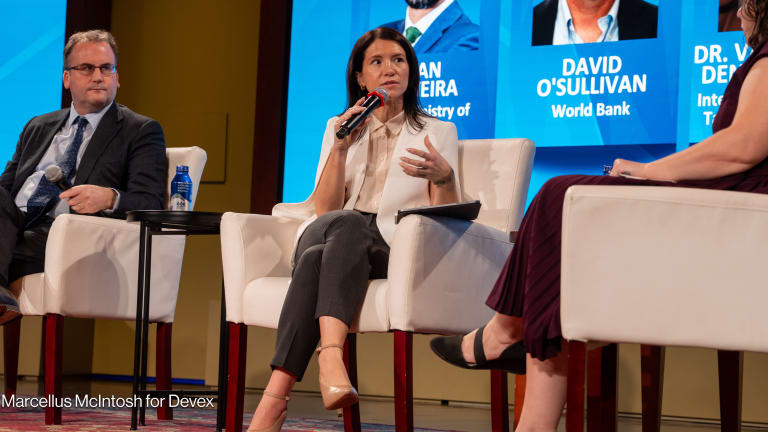Are big aid donors helping developing countries grow their domestic revenues?

Domestic revenue mobilization — or to put it more simply, collecting taxes and other financial resources from within country borders — has always been a high priority issue for developing countries. Since the 2030 Agenda was agreed, it's been even higher on the agenda.
Many countries with high numbers of the world's poorest people collect nowhere near enough domestic revenues to deliver basic services, such as education and health, to the poorest people. They also lack the ability to resource the comprehensive domestic investments, such as in strengthening economic and material infrastructure, which are required to ensure sustainable development and growth.
Given these challenges, and the importance of domestic revenues to achieving the Sustainable Development Goals, many of the world's largest donors committed at the third International Conference on Financing for Development last year to scale up their aid for domestic resource mobilization.
The commitment was voluntary and under the newly formed Addis Tax Initiative, which was not part of the formal United Nations outcome document. It was also quite specific: donors committed to collectively double their aid for DRM in the form of technical cooperation (essentially, the provision of donor-funded technical or expert advice to enable projects or programs to be delivered).
In itself, the ATI commitment is welcome, although obviously it only addresses one aspect of the much wider challenges of mobilizing resources that developing countries face. A large number of developing countries have signed up, and hope to benefit from the partnerships that can happen under the ATI. The ATI also commits them to implementing other tax policy reforms, such as those set out by the joint Organization for Economic Cooperation and Development and G-20 Base Erosion and Profit Shifting initiative, aimed at tackling global tax evasion and avoidance. Some of the technical cooperation may well be used to implement these reforms.
How successful are current ATI commitments?
However, there’s one small problem: currently, ATI commitments relating to aid are impossible to monitor. We don't actually know how much technical cooperation for DRM there is at the moment, so there's no baseline from which to scale up (though our report estimates around $48 million annually). More importantly for developing countries, because of the way reporting of aid for DRM currently works, it's difficult to analyze the aid partnerships in detail.
What we do know so far is that the United Kingdom, United States, Norway and a few other countries specialize in this kind of aid and have long-term programs in these areas, providing technical expertise in tax policy and administration reforms. We also know that aid for DRM can lead to significant concrete impact in terms of increased revenues, when used strategically in support of a comprehensive program of government-led reform. This is what evidence suggests happened in Mozambique, where a several donors, including the U.K., gave aid to support DRM efforts for a number of years.
However, aid for DRM can also fail to achieve its goals, as in the well-known case of Pakistan, where a number of challenges combined to stop the project delivering its objectives. Big projects that fail can offer important lessons, and these too need to be looked at. As donors prepare to scale up their efforts and give more aid for DRM, it's therefore imperative we understand these efforts better, and are measuring results in the long term.
The need for better communication and reporting
Improvements to reporting data would, of course, get us better numbers. But there's a step before that, because reporting processes should respond to the goals of the partnerships and most importantly the development needs of partner countries. This means open dialogue to agree on what is being monitored.
While a starting point for dialogue could be the principles of progressive, sustainable taxation outlined in the Addis Ababa Action Agenda, in reality, every country needs a tax system suited to their own context, and it's important for the tax policy reform process to be locally owned and led. So, opening up dialogue between partner countries, donors, civil society, and other stakeholders (such as the private sector) is critical at this point to ensure we have their priorities captured and can discuss tricky issues together, learning from existing cases and experiences.
As we agree on the results aid for DRM should be achieving, we also need to look at improving reporting. Donors need to report in an open and transparent way, particularly around technical cooperation (the focus of the ATI commitments), so we can ensure that third parties involved in delivering aid for DRM are doing it as effectively as they can be. And the reporting needs to be detailed enough to provide qualitative information. Monitoring inputs (how much was spent, what activities were undertaken) tells us very little about whether the intervention worked, and if it did, what were the reasons it worked. This is exactly the kind of information needed to stimulate learning and solutions-focused dialogue at the international level. This is also what developing countries often demand in policy dialogues to help them make decisions.
A big step has actually just been taken to improve the data available on aid for DRM: donors of the OECD’s Development Assistance Committee have agreed to use the same purpose code to report aid being used to support tax administration. This is an essential first step and will go a long way to helping us understand what is being spent and where.
Evaluating success
Next, donors need to go further: not only report the data consistently and in a timely manner, but to provide qualitative information to help open up dialogue on what worked and why. For example, they could report on the detail:
• What financing or administrative mechanisms were used in the project?
• How were multiple donors working together, and what role did government play, not only the implementing department or ministry, but wider stakeholders?
• How was the decision taken to take a specific policy approach, and why was that the right thing for this country context?
• Which third-party consultants were involved, and what role did they play in decision-making?
Reporting should also be results focused and should address how much revenue was generated and which taxes were implemented. Such information would enable in-depth case study analysis and success case comparisons, helping governments understand and continue their progress in generating domestic revenues.
First steps should be setting up a comprehensive global approach to tackling illicit flows, and donors providing wider support for revenue generation — in areas such as trade, infrastructure and productive capacity. In line with this, understanding the results of these small but important flows of aid for DRM can ensure a coherent approach from the international community to strengthening developing countries' economies in a sustainable way.
This week, countries are meeting at the U.N. for the Financing for Development Follow-Up Forum, to discuss how they will be monitoring and reporting on the commitments they made last year on financing the new SDGs. Let's hope that promoting open dialogue focused on results, and delivering on the commitments of the ATI is on their agenda.
Join the Devex community and access more in-depth analysis, breaking news and business advice — and a host of other services — on international development, humanitarian aid and global health.
Search for articles
Most Read
- 1
- 2
- 3
- 4
- 5








